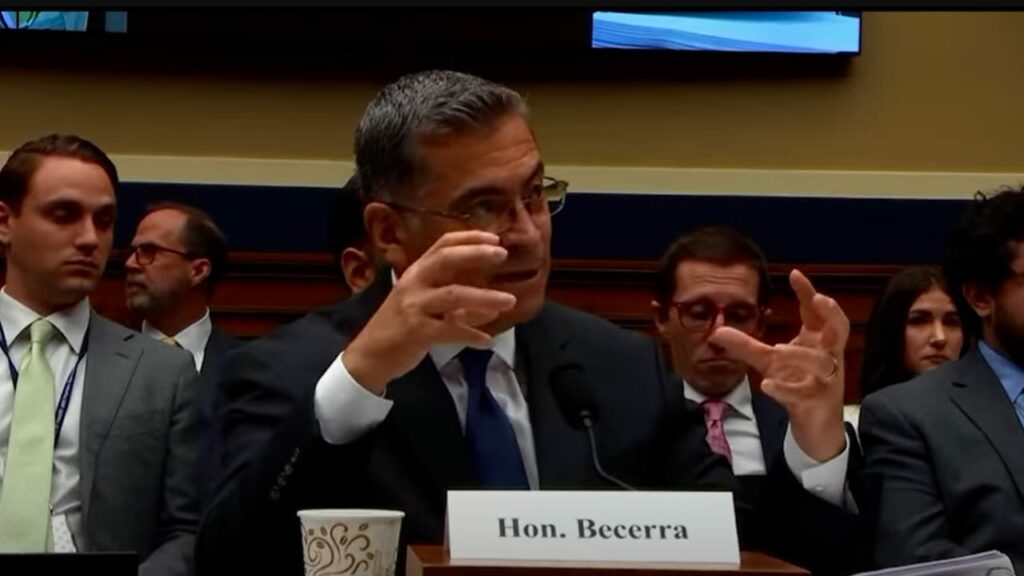If you want to search Cost Curve back issues or link to anything you read here, the archive is online at costcurve.beehiiv.com.
If you care about the copay accumulator issue, you really need to see this five-minute back-and-forth on the issue between Rep. Buddy Carter and HHS’ Xavier Becerra in which is it abundantly clear that Becerra has no idea what’s going on. (The repeated references to Medicare are a tell, given that accumulators have zero to do with Medicare.)
That generated some scathing LinkedIn takes, including this one from Bill Sarraille and this one from the HIV + Hepatitis Policy Institute’s Carl Schmid.
I’m not as angry as those guys. If you run HHS, you have a lot of balls in the air, and if that means you get mixed up sometimes, well, that’s an occupational hazard.
But what it says is that the administration sees regulation of PBMs in general and benefit design in particular as a detail not worth sweating, and that, in itself, is noteworthy. It’s also not surprising, given the recent evidence. Joe Biden has been talking drug prices without whispering a word about PBMs, and I made much of the fact that Becerra hosted a White House event on PBMs without really even talking about PBMs.
It’s fair to be upset that Becerra flubbed his testimony and isn’t tracking on HHS legal strategy.
But the real takeaway is that this administration has absolutely no plan to go after PBMs.
Which is kind of weird, no?
This is a really good piece, in Health Affairs Forefront, asking CMS to take seriously the IRA’s mandate that data on subpopulations be included in decisions around price-setting. The argument focuses on specific populations, especially those that are underserved, but it also makes the broader point that meds have hugely heterogeneous effects. Not taking into account the possibility that some individuals may see outsize benefits risks harming access or innovation.
This is a really, really good piece, in BioCentury, that takes aim at a recent JAMA study by the Harvard PORTAL group that suggested that the FDA was letting all kind of ineffective cancer meds stay on the market. The BioCentury commentary, by Steve Usdin, dean of the FDA press corps, goes at the authors of the JAMA piece with both barrels, calling the analysis “irresponsible,” “clickbait,” and “intellectual malpractice.” Remind me never to cross Steve.
This Politico article goes deep on the complexities of reimbursing anti-obesity medicines, using the state of North Carolina as an exemplar of all the different moving pieces. I’m probably not a good judge of this kind of article, because no matter how deep the analysis goes, I tend to feel like critical points are missing (in this case, a real discussion of cost-effectiveness and the related, required honest discourse around budget impact).
I’m glad to see that alternative funding programs — approaches where specific drugs are left uncovered by insurance companies so that otherwise-insured patients can receive the meds via charity programs and other workarounds — got some love on Capitol Hill. BIO’s Good Morning BIO has the scoop (I didn’t see coverage elsewhere).
One of the ways that the Colorado PDAB is assessing whether medicines are unaffordable is by sending out internet surveys. They’re not getting a lot of responses, and it’s really hard to imagine that the data coming out of that effort is high-quality enough to be used for critical policy decisions. But here we are. Anyway: the surveys for Cosentyx and Stelera are still live if you want to see how the questions are framed (or have someone you think ought to go through the exercise).
This CNN story highlights some of the places where the recent $35 out-of-pocket caps on inhalers don’t reach, including generic Flovent and other meds aimed at young children. I respect the heck out of CNN reporter Meg Tirrell’s ownership of this study, but I’m a broken record on this: I’d still love to see some better math on the economics here.
If this email was forwarded to you, and you’d like to become a reader, click here to see back issues of Cost Curve and subscribe to the newsletter.





